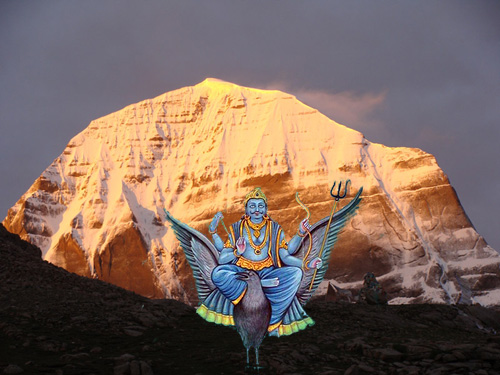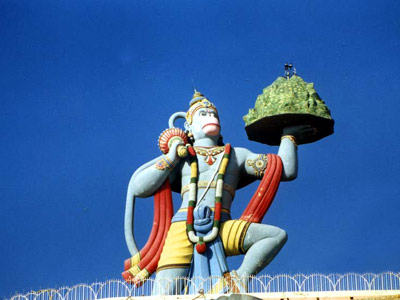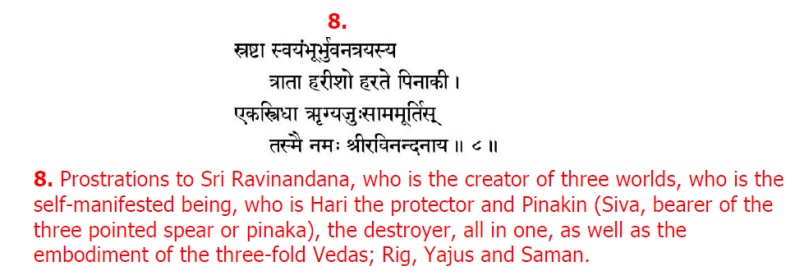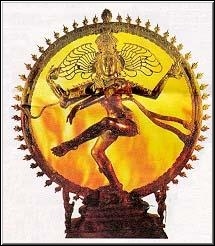
Saturn is both son of The Sun by his shadow wife Chaaya, and the most powerful of all the planets in that all seek to avoid his gaze, drishti. There is another whom all seek to avoid the gaze of, Lord Shiva, for the dristhi of the third eye of Shiva causes whatever is seen to burnt. Both deities have all properties of creation-preservation-destruction, in addition to unavoidable energy that has power, shakti, over all that exists. None can avoid the sade-sati of Lord Saturn; None can avoid Lord Shiva, the receiver of all things.
Saturn - Sani (var, Shani) is also known as Shanaishcharaya, Pingala, Bhabru or Roudra. Pingala means bearer of the Trishul, the trident. It is said that Saturn can raise status to the skies and at the same time, drop one into abysmal depth. Saturn's dristhi (sight) is very powerful; the lesser gods, sages, demigods, gods and even the Trimurthi of Brahma - Vishnu - Maheshwara cannot escape the powerful sight of Saturn.
Saturn affects all humans with 3 times x seven and half year cycles (sade-sati) during their lifetime; he also affects gods to a lesser extent, for seven and half minutes.
In Vedic Astrology, Shiva is said to be represented by Saturn. Saturn, like Shiva, strips away maya, the veil of illusion and separate self. Saturn takes aim at the imprinting we have experienced around separation consciousness. This imprinting does not represent who we truly are but rather the activity of the ego where it creates identifications and boundaries with the outer world that we have taken on for survival. Above all, the ego fears its annihilation.
Saturn, like Shiva, is a force of destruction and transformation. Each one of us has to be prepared to sacrifice at a moment's notice all attachments to the material, everyday world. The ego places limitations on us and prevents us from seeing reality as it truly is. Men and women have to find the courage to somehow go beyond their limitations. Both Saturn and Shiva give impoverishment and deprivation to humans that they may continue existing, free of the shackles of attachment. Saturn and Shiva deprive us of external actions; instead of reacting to perceived misery, we may take up the inner instruments of action, the jnanendriyas, and use the tools of intellect, discrimination and detachment.
Hanuman and Saturn: sade sati

In one of the tales of Saturn, Saturn approached Lord Hanuman and told him his sade-sati (seven-and-a-half-years of misery) was about to begin. Hanuman asked, "Which part of my body do you intend to inhabit?"
Saturn replied, "I will be sitting on your head".
Hanuman said, "Very well!" When the appointed day duly dawned, Saturn settled himself comfortably atop the vanara's head. Hanuman began to play a little game. He would take a heavy mountain, throw it high into the air and let it slam onto his pate. After a few minutes of this, just when Hanuman was beginning to enjoy himself, Saturn cried out to him, "Stop! Let me off! I'll leave you alone!"
Hanuman said to Saturn, "You mean you've had enough?" Saturn replied, "Yes, I've had enough. But at least I made you hit your head."
Dasaratha Shani Stotra
Saturn enters the star constellation (or nakshatra) - called Rohini once in every 30 years. This is one of the most dreaded transits of the kings and their kingdoms. The scriptures say "Kings will die and kingdoms will fall when Shani enters Rohini". It is said that during the reign of King Dasaratha when Shani was about to enter Rohini nakshatra, King Dasaratha worshipped Shani. Pleased with the King's prayers, Saturn did not enter Rohini during the reign of King Dasaratha. Hence the Dasaratha Shani Stotras are considered an excellent remedy for Saturn related troubles.
One of the stotras of the Great Saturn Prayer by King Dasaratha makes reference to Saturn as embodiment of the Vedas, Lord of Time and Creator-Preserver-Destroyer:

Sathya Sai Baba told that everything is magnetism. Planets - non-luminaries - reflect the light of the Sun and redirect that magnetic energy that is flowing to the Sun and through the Sun to the human person. Saturn is the slowest planet whose power is seven times stronger than the Sun; Saturn is Lord of Time, Destiny and Discipline. Saturn, along with Lord Shiva, make you earn discipline, self-discipline that leads to self-respect, self-confidence and self-realisation. Just as Saturn and Shiva make you earn your discipline through karma and deprivation, under the rule of Sani-vat-Rahu, Rahu magnifies the need for self-control and self-discipline.
Saturn in ancient times was known as Kronos, the keeper of Time. In the Hindu tradition it is Shiva who personifies this function, and upon comparison it becomes apparent that many of the attributes ascribed to Kronos are similar to those associated with Shiva. Shiva can easily be identified as the god of Time by merely noticing that his damaru (drum) is in the shape of an hour-glass. And the crescent moon on his brow reveals his association with the feminine principle in Nature as well as with the sickle which cuts eternity into hours and yet becomes the tool in the hands of the Good Gardener. The Good Gardener is the One who helps you to obtain release from the shackles of illusion and the cycle of birth-death and rebirth.
Astrology - and the devotional prayers - make reference to Saturn being "lame" and "slow" (manda), because he is the slowest of the nine planets. In North India they say that Time has very short hair on his neck and runs very fast; people try to catch him but can't hold onto his hair. Saturn is Time, and Saturn's slowness also makes him easy to catch. Sincere penance and devotion, which are good ways to "catch" Saturn, can make a good difference in the tendency to create imaginations and inner perceptions which energise and strengthen one's self-created limitations. The mind is like a camera, which records the image where it is pointed; the mind takes the form of what it is imprinted with. Prayers, devotions and offerings to Saturn may assist the diversion of such images, imagery and self-identification and remove these from the focus of the mind. Direct worship of Saturn or worship of Lord Shiva or the vanara Lord Hanuman, is tested, effective ways to conquer "what comes naturally". Lord Shiva is the god of death and time and can influence Saturn because Saturn is but an amsa, a part or portion of His power.

It is to be noted that Yama, the brother of Saturn is frequently presented as Lord of Death and his orderlies called yamdoots are sent to collect the souls and present them to Lord Yama at death for the judgement. This is traditional; what has to be remembered is that Lord Yama, brother of Lord Saturn, is God of Dharma. The only place where the human may follow dharma is in a human body. When one gets to Yama, it is too late to take up the practice of dharma, right conduct, righteousness. In this wise the works - or afflictions - or seven-and-a-half years of Saturn gives the opportunity to refocus the mind, take up the inner instruments of action (discrimination and detachment) and follow dharma. Dharma is that which upholds and protects; dharmam moolam jagat is the teaching, the jagat (universe) rests upon dharma ~ right conduct.
Best to follow the advice Krishna gave to Arjuna on the battlefield of Kurukshetra: Get up and follow your caste duty: Get up and fight! One always does well to pull themselves up by their own bootstraps (thus, grace may be given), get out of the well of misery and self-sorrow and follow dharma. Thereafter, the grace and protection of Lord Saturn and Lord Shiva may directly address one.
![]()
